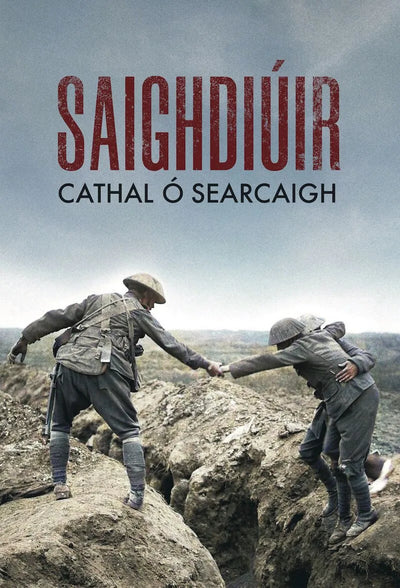No Products in the Cart

Faoi thailm na bpléascán agus chnagarnach bhuan na ngunnaí móra, faighimid radharc scanrúil ar an chogadh trí shúile an fhir óig seo as Gaeltacht Chloich Chionnaola, agus é féin agus a chomhaoisigh á gcur thar an mhullach isteach sa chath, gás nimhe ag scalladh na scamhóga astu, agus an fód á dheargadh lena gcuid fola.
In ainneoin na mílte Éireannach a thit i gcogadh mór 1914-1918, is beag trácht orthu i litríocht na Gaeilge. Seo é an chéad úrscéal sa teanga a insíonn a scéal. Ní hé amháin gur saothar ceannródaíoch é Saighdiúir ach is úrscéal cumhachtach frithchogaidh é, agus é tugtha chun solais go húr beo máistriúil ag Cathal Ó Searcaigh.
Le breis agus daichead bliain tá a mharc searcúil féin á chur ar an mórfhile Conallach seo ar litríocht na Gaeilge. Ní heisceacht ar bith an saothar nua seo, an stíl ghlansnoite chéanna phróis a chleacht muintir Ghrianna roimhe curtha os ár gcomhair arís go fuinte fileata ag Ó Searcaigh, cúram an fhile tugtha aige do chaint na coitiantachta. Tá oighre faighte acu i dtaca le máistreacht teanga.
Tógfaidh an leabhar seo, Saighdiúir, a háit ar an tseilf in éineacht le húrscéalta Erich Maria Remarque agus Jaroslav Hašek, agus níl aon amhras ach gurb é úrscéal mór Gaeilge an Chogaidh Mhóir é. Faoi scáth an Earagail i nGaeltacht Chloich Chionnaola atá cónaí ar Chathal Ó Searcaigh, duine de phríomhfhilí na Gaeilge. Ar na leabhair is deireanaí uaidh tá Errigal: Sacred Mountain, Teach an Gheafta, agus An Bhé Ghlas. Bhronn Ollscoil na hÉireann céim oinigh air sa bhliain 2000 agus bronnadh The Ireland Literary Award air i 2007. Bhuaigh sé an Irish Times Literature Prize i 2001. Tá sé ina bhall d’Aos Dána.
.........................................................................................................
This is the first novel in the Irish language to deal with the First World War. It is a landmark work of literature, a compelling account of life and loss on the western front.
The novel’s protagonists are two young Gaelic speakers from Cloich Cheann Fhaola in north west Donegal who believe they are going on a glorious adventure without any real notion of the horrific realities they would encounter as infantrymen on the western front. Saighdiúir (Soldier) is an immensely moving book that evokes the horror and the terror of that dreadful conflict. It gives vivid heart-rending descriptions of the tragic waste of brief young lives fed into the voracious jaws of war. It is a harrowing corrective to the myth of a just war.
The book goes beyond military history, though, to give voice to the futility and pathos of all wars. In that respect it’s a raw, haunting anti-war novel. It captures the living hell of the front lines, the bombardment of bursting shells and belching artillery, the water-logged trenches, the dawn raids, the deadly mustard gas, the mud and blood and grime of a senseless war. And yet, in this endless horror the power of the human spirit to endure is truly remarkable. And in the midst of this savagery and slaughter are moments of tenderness, of immense courage and companionship.
Two hundred thousand Irishmen fought in the First World War. Until recently, the joining-up of these legions of men was, mostly, excised from our troubled history. This novel brings forth that lost, largely forgotten generation of Irish soldiers who fought and fell on the western front. It is a universal story of the brutality unleashed by war and a fitting testament from a generation marked for slaughter. This is a remarkable war novel and will stand with the best of its kind, an authentic and compelling addition to the war literature of Sassoon, Owens, Rosenberg and Remarque.

